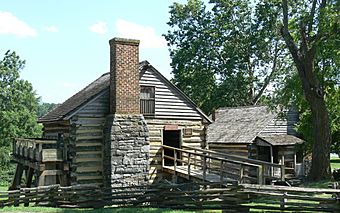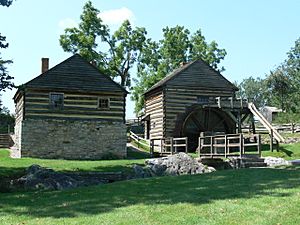Cyrus McCormick Farm facts for kids
|
McCormick Farm and Workshop
|
|

Grist mill (left) and blacksmith shop (right)
|
|
| Location | S of Staunton on U.S. 11 and Raphine Road at Walnut Grove, Steele's Tavern, Virginia |
|---|---|
| Area | 644 acres (261 ha) |
| Built | 1809 |
| NRHP reference No. | 66000846 |
Quick facts for kids Significant dates |
|
| Added to NRHP | October 15, 1966 |
| Designated NHLD | July 19, 1964 |
The Cyrus McCormick Farm and Workshop is a special place in Virginia. It was once the family farm of a famous inventor named Cyrus Hall McCormick. His farm was also known as Walnut Grove. Cyrus McCormick invented and improved the mechanical reaper. This amazing machine helped farmers harvest crops much faster and easier. Later, his invention led to the creation of the combine harvester, which is still used today!
This historic farm is located near Steele's Tavern and Raphine in Virginia. Today, it's a museum run by Virginia Tech's agricultural station. You can visit the museum for free! It covers about 5 acres of the original 532-acre farm.
Contents
The Farm's Story
The McCormick farm started in 1822. It was built by Cyrus's father, Robert McCormick. The farm originally spread across 532 acres. Today, eight of the nine original buildings are still standing. Many of these buildings have been fixed up since they were first built.
Buildings on the Farm
Each building on the farm had an important job.
- The grist mill was built before 1800. It was used to grind wheat into flour for baking.
- The blacksmith shop was where tools were made and fixed. This is also where Cyrus McCormick created his famous reaper!
- The manor house was the first building on the farm. It was made of brick in 1822 and was the main family home.
- The smoke house was behind the manor house. Meat was dried and smoked here to keep it fresh through the winter. This was important before refrigerators existed.
- The carriage house kept carriages and other wheeled vehicles safe from the weather.
- There were also quarters for the forty-one people who were forced to work on the farm.
- A schoolroom was on the property for the McCormick children and other kids nearby.
- A housekeeper's quarters was also part of the farm.
One building, an ice house, was taken down in the 1960s.
Cyrus McCormick's Big Idea: The Reaper
The McCormick Farm at Walnut Grove is famous as the place where the mechanical reaper was born. This machine was a huge step toward the modern combine harvester. Cyrus McCormick reportedly designed, built, and tested his first reaper in just six weeks! He might have improved on ideas his father and brother had worked on for 20 years.
After building his first reaper, Cyrus used it to harvest his first crop that same year. He kept working on his invention, making new and better models almost every ten years.
Moving to Chicago and Building a Company
After his father passed away, Cyrus McCormick moved his business. In 1847, he went to Chicago, Illinois. He chose Chicago because the midwestern United States had huge areas of fertile farmland. In 1859, his brothers, Leander James McCormick and William Sanderson McCormick, joined him. Together, they formed a company called Cyrus H. McCormick and Brothers.
By the late 1800s, McCormick's company had made an early version of the combine. This machine could harvest grain even faster and cheaper than the first reapers. Before the reaper, a farmer could harvest only about half an acre a day. With McCormick's machine, a farmer could harvest 12 acres a day with much less hard work! The mechanical reaper changed farming forever. It allowed families to farm much larger areas of land than they ever could before.
In 1902, McCormick's company joined with other companies, like the Deering Harvester Company. They formed a new, bigger company called International Harvester.
Keeping History Alive
The McCormick family owned the farm until 1954. Then, they gave it to Virginia Polytechnic Institute (Virginia Tech). It became an agricultural center and a memorial to the farm's history. Today, the schoolroom still has old textbooks, toys, and school supplies from the 1830s.
In 1964, the property was named a National Historic Landmark. This means it's a very important historical site in the United States. The farm is easy to find, less than 5 miles from Interstate 81, between Lexington, Virginia and Staunton, Virginia.
See also
 | Leon Lynch |
 | Milton P. Webster |
 | Ferdinand Smith |




